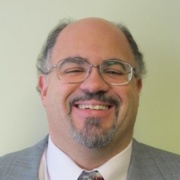Ian Palao, Vice President, Strategic Energy Services

Please include details about your educational background and what sparked your interest in atmospheric or related sciences.
Growing up in New Orleans, I had much exposure to the power of the atmosphere, from hurricanes to brief but intense thunderstorms where it seemed like the atmosphere was an angry demon. I developed a fascination with weather from a fairly young age.
Regarding formal education, I attended Florida State University and obtained both a B.S and M.S. In grad school, I chose the climatology option and truly loved the educational/professional environment afforded by the department.
What was your first job in the field and how did you end up in the job you are in now?
My first professional meteorological job was at NASA Stennis Space Center working as a contractor for NOAA's National Data Buoy Center. I performed all sorts of analysis of buoy data including analyzing spectral ocean wave data and using extreme value theory to estimate "design waves." While I enjoyed the job, I knew there were other opportunities where my skill set could be of use. I jumped ship to the utility/energy industry. The bulk of my time in energy (23 years total as of 2020) has really been spent in energy trading and commodity risk management. Meteorology and climatology play such a huge role here!!! I was a natural fit!
What opportunities did you pursue that you knew would be beneficial to securing a job in the profession?
This is all in hindsight. None of this was planned with a specific end-goal in mind other than obtaining a job, any job. The two things that have helped me the most the past 20 years are my understanding of climatology and statistics. The classes that I took were very instrumental in providing a foundation that I use daily.
What other courses/skills beyond the required math and science courses do you think would be the most helpful to individuals wanting a career in your profession?
Statistics!!!! To me, it has been the single skillset I have that has propelled my career. It is such a powerful tool that can be used everywhere.
What is your typical day on the job like?
First off... I look at the weather models. I want to see what the next 10-15 days may bring. Next, I look at the overnight trading of natural gas to get a view of the broader market. From there, I combine the two to get MY VIEW. The rest of the day can be spent in communicating with clients, executing electricity trades on behalf of clients to hedge their position, or doing any kind of analysis to meet the needs of my clients.
What do you like most about your job? What is the most challenging thing about your job?
What do I like most? Guiding my clients through rough waters and ensuring that they have a profitable business. As a consultant, we are heavily relied upon for our expertise and opinion. The most challenging??? Predicting the future. Clients rely on me to predict what the near-future will look like. As you can see, what I like most and what is the most challenging are basically one and the same!
Does your job allow for a good work/life balance? If not, why?
Yes, I have learned to leave the job on the job. I think any career can "eat you alive". The individual just has to set boundaries (emotional/mental/physical) to prevent that.
Over the course of your career what is the most exciting thing that has happened to you?
During my years with NDBC, I spoke at a WAVES Conference and was contacted a few weeks later by an editor to write an article for "Sea Technology" magazine. I was pretty enthused about that!! It gave me a lot of needed confidence regarding my communication skills.
Is there anything you wish you had done differently in your career?
Hmmmmmm....not really. It has worked out pretty well. I used to think that if I had majored in Statistics, I could've went to trading even sooner. But, I wouldn't have the climatology knowledge which is so vital to energy. So, I'm happy with how it has transpired.
What are some ‘must haves’’ on a resume if a person wants to gain employment in your field?
Skill set. Having a significant strength (and making it obvious on your resume) will get you noticed. The key is finding the company that needs your particular skill at that moment. For me, it was Statistics. I applied for a job in energy trading having zero background knowledge of the industry. At the interview, I told that to the VP. His exact words were, "I know that. But I think you will be a quick learner." He was correct. My Statistics knowledge transferred to the energy trading world very easily. It's been a fun ride ever since.